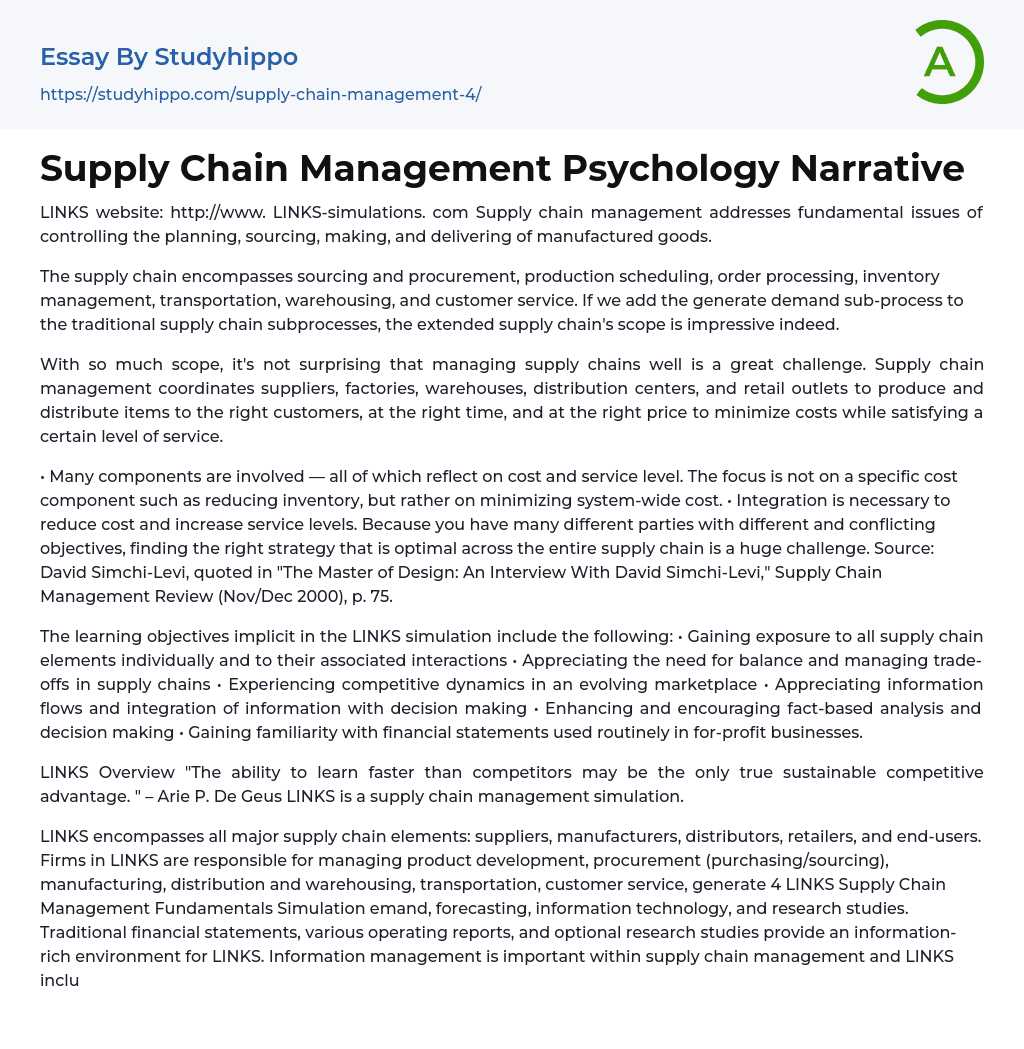

Supply Chain Management Psychology Narrative Essay Example
Supply chain management addresses fundamental issues of controlling the planning, sourcing, making, and delivering of manufactured goods. The supply chain encompasses sourcing and procurement, production scheduling, order processing, inventory management, transportation, warehousing, and customer service. If we add the generate demand sub-process to the traditional supply chain subprocesses, the extended supply chain's scope is impressive indeed.
With so much scope, it's not surprising that managing supply chains well is a great challenge. Supply chain management coordinates suppliers, factories, warehouses, distribution centers, and retail outlets to produce and distribute items to the right customers, at the right time, and at the right price to minimize costs while satisfying a certain level of service.
Many components are involved — all of which reflect on cost and service level. The focus is not on a specific cost component such as reducing inventory, but rather on minimizing system-wide cost. Integr
...ation is necessary to reduce cost and increase service levels. Because you have many different parties with different and conflicting objectives, finding the right strategy that is optimal across the entire supply chain is a huge challenge. Source: David Simchi-Levi, quoted in "The Master of Design: An Interview With David Simchi-Levi," Supply Chain Management Review (Nov/Dec 2000), p. 75.
The learning objectives implicit in the LINKS simulation include the following:
- Gaining exposure to all supply chain elements individually and to their associated interactions
- Appreciating the need for balance and managing trade-offs in supply chains
- Experiencing competitive dynamics in an evolving marketplace
- Appreciating information flows and integration of information with decision making
- Enhancing and encouraging fact-based analysis and decision making
- Gaining familiarity with financial statements used routinely in for-profit businesses.
LINKS encompasses
all major supply chain elements: suppliers, manufacturers, distributors, retailers, and end-users. Firms in LINKS are responsible for managing product development, procurement (purchasing/sourcing), manufacturing, distribution and warehousing, transportation, customer service, generate. Traditional financial statements, various operating reports, and optional research studies provide an information-rich environment for LINKS. Information management is important within supply chain management and LINKS includes various optional information enhancements (information technology and research studies) available for a fee.
- Abnormal Psychology essays
- Social Psychology essays
- Developmental Psychology essays
- Jean Piaget essays
- Positive Psychology essays
- Classical Conditioning essays
- Counseling essays
- Psychoanalysis essays
- Educational Psychology essays
- Behaviorism essays
- Authority essays
- Operant Conditioning essays
- Maslow's Hierarchy Of Needs essays
- Mental Health essays
- Personality Psychology essays
- Psychotherapy essays
- Family Therapy essays
- Stanford Prison Experiment essays
- Abraham Maslow essays
- Erik Erikson essays
- Cognitive Psychology essays
- Sigmund Freud essays
- Attachment Theory essays
- Supersize Me essays
- Individual essays
- Infant essays
- Childhood essays
- Adolescence essays
- Growth Mindset essays
- Is Google Making Us Stupid essays
- Childhood Memory essays
- Positive Attitude essays
- Reinforcement essays
- Archetype essays
- Maturity essays
- Deception essays
- Certainty essays
- Conformity essays
- Aggression essays
- Behavior essays
- Human Behavior essays
- Obedience essays
- Adult essays
- Procrastination essays
- Morality essays
- Altruism essays
- Human Sexuality essays
- Role Model essays
- Perseverance essays
- Expressive essays



